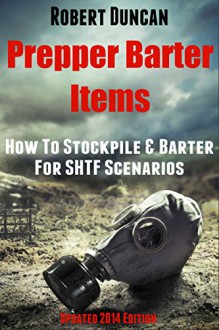You're About To Discover a Valuable Information Allowing You and Your Family to feel Secure, Prepped and Ready to Act When The Next Inevitable SHTF Scenario Occurs Bartering seems like a skill that belongs exclusively to the ancient past or when you’re on vacation in Mexico trying to bring down...
show more
You're About To Discover a Valuable Information Allowing You and Your Family to feel Secure, Prepped and Ready to Act When The Next Inevitable SHTF Scenario Occurs
Bartering seems like a skill that belongs exclusively to the ancient past or when you’re on vacation in Mexico trying to bring down the price of a bead necklace, but trading goods for goods, or goods for services, has never died out since its origin thousands of years ago. Many people have found a way to live without money and whenever currency is weakened through economic recession, trading goods becomes the only way to get the resources needed to survive. Between the World Wars in Germany, the value of money was so weak that people had to bring wheelbarrows spilling over with coins just to buy a loaf of bread. During the Great Depression in 1940s America, people had less money and so turned to bartering off their possessions to get what they needed. Our modern society is just as vulnerable to economic collapse as it was in the past, so learning how and what to barter now is extremely valuable.
There are a number of scenarios where money would lose its value:
Inflation
Current account deficit
Lower commodities price
Personal poverty
Inflation happens when the price of goods goes up and the value of money goes down, like in Germany (many decades ago) where it cost hundreds of coins to buy something as small as a loaf of bread. Inflation can occur when a government is printing too much money and is flooding the nation with paper currency that it does not know what to do with. A government might print a lot of money because it is attempting to pay off its debts.
Current account deficit is when a nation is importing more than it is exporting. It is similar to when an individual is buying more goods than they can afford to pay for. The currency of a country with a current account deficit will lose its value on a global scale, and the resulting actions they take to recover will affect the internal value of money.
Money can also lose its value when the price of commodities that a country exports falls globally. The exchange rate also changes (people will lose money when they exchange their currency for another), and the country has to figure out how to recover from its low export revenue.
Bartering may also become necessary on a more individual basis, like when a person becomes very poor but possesses certain skills and goods they want to trade. This actually puts them at an advantage for getting the best goods as others will be happy to not hand over their paper money and may not be aware of what certain items are worth.
These are all scenarios that are currently occurring around the world. Many countries are able to remain stable through them, but eventually, it becomes difficult to stay on course and ultimately, the people of the country are the ones who suffer. Many small communities are already dependent on bartering and busy cities based on money and intangible currency could learn a thing or two from them. Learning to barter gives you control over your own life and free you from the roller coaster of the international economy and politics that dictate the value of money.
Here Is A Preview Of What You'll Learn...
Why store items to barter with? Why there is a real need to prepare for the unexpected What everyday food and liquids you should be storing and whyWhat items others will truly find valuable during a crisisMedical supplies , what to store and how to use it to your maximum advantagePower supplies – What to store and how to trade itHow to protect yourself while tradingHow to store and maintain your barter items to protect them from othersHow to barter your skills to help you and your family survive
Tags: Urban Prepping, prepper, STHF, urban survival, barter,bartering, disaster prepar
show less

